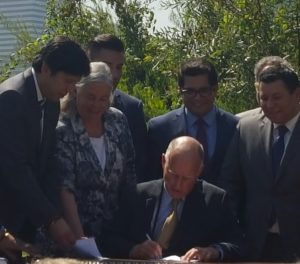Bill Magavern, Coalition for Clean Air, 916-527-8051
FRESNO, CALIFORNIA – In what advocates for underserved communities are calling “the greatest story no one knows,” California Gov. Jerry Brown will sign legislation today dramatically expanding California’s commitment to use climate change policy to attack pollution and poverty together. In a Fresno ceremony at 11:30 this morning, Brown will sign AB 1550 (Gomez), which guarantees that going forward, at least 35 percent of Greenhouse Gas Reduction Fund proceeds will benefit underserved communities and low-income Californians.
At the same time, the governor will sign legislation allocating $900 million collected from polluters in the state’s carbon auctions to projects such as urban forestry, clean transportation, home weatherization and solar power for low-income families. Some of that money will fund another bill to be signed today, AB 2722 (Burke), which establishes the Transformative Climate Communities program, a unique effort to tie together multiple climate and clean energy efforts such affordable housing near transit, energy saving and clean transportation into an integrated community-wide approach.
“AB 1550 invests real dollars in projects that both reduce greenhouse gas emissions and allow the neediest families to save on electricity, transportation, and other household costs — underscoring the fact that California can reach its climate goals while also tackling the crisis of extreme inequality,” said Chelsea Tu, staff attorney at Public Advocates.
“This may be the biggest story that almost no one’s noticed,” said Greenlining Institute Environmental Equity Director Alvaro Sanchez. “California decided to fight poverty with the same program that fights climate change and pollution, bringing jobs, investment and consumer benefits to disadvantaged communities. We’ve created a model for the nation to follow.”
“While some legislators dance to the tune of Big Oil, others are mainly interested in bringing their districts tangible benefits, like the clean transportation and energy investments being made today,” said Coalition for Clean Air Policy Director Bill Magavern. “And it was those Assemblymembers who provided the votes to give SB 32 the majority that it had lacked last year.”
“Now, our families will benefit from solutions that reduce fossil fuel pollution, improve the air our children breathe, and secure critical investments for our neighborhoods most deeply impacted by the climate and economic crisis,” said Miya Yoshitani of the Asian Pacific Environmental Network. “We applaud the legislature and the governor for lifting up community-led solutions that bring shared prosperity and a healthier climate.”
“The passage of this year’s historic climate legislation package means that by 2030, California communities will be less polluted and more resilient,” said SCOPE Research Director Laura Muraida. “AB 1550 and AB 2722 are critical to ensuring that disadvantaged communities — largely low-income communities of color — are at the center of this transformation.”
Last year, The Greenlining Institute collected 10 case studies that illustrate the impact of California’s climate investments on underserved communities. Stories of real Californians impacted by these clean energy policies, as well as background on the laws themselves, can be found at UpLiftCA.org (English) and es.UpLiftCA.org (Spanish).
[share title=”Share This Post”]








